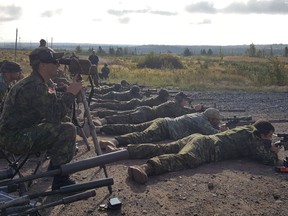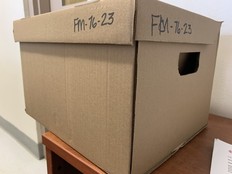Maine government studying Agent Orange use at Base Gagetown
Commission reignites push for Canadian inquiry into base's history of herbicide spraying

Article content
The federal government says it doesn’t plan any further inquiries into Agent Orange tests decades ago at Base Gagetown despite fresh calls rising from a current study in Maine on the impact on U.S. soldiers who were stationed there at the time.
A resolution was passed in Maine in July to create the Gagetown Harmful Chemical Study Commission. Meetings were held Nov. 15 and 30 and again Wednesday.
Canadian Gagetown veteran Gary Goode, chair of the Brats in the Battlefield Association, testified at the commission. He said the findings of the study are expected to be presented Dec. 15 in the Maine legislature.
He’s hoping the finding might ignite a similar one from Ottawa.
“All we’re asking for is a fully independent public inquiry in Canada into Agent Orange spraying at Base Gagetown,” said Goode, who said he lost his right lung in 2005 to the effects of Agent Orange exposure.
Agent Orange was a herbicide used by the U.S. military to control and destroy vegetation in the battlefield during the Vietnam War. In 1966 and 1967, defoliants such as Agent Orange, Agent Purple, and Agent White were tested at Base Gagetown by U.S. officials. The affected sites were in a 33-hectare forest containing both deciduous and coniferous trees.
Certain cancers and other health problems are now recognized as being associated with exposure to Agent Orange. Goode’s group, politicians, and veterans associations have long been calling for the feds to lead a public inquiry into its use at Gagetown and its effects on humans.
It’s believed all traces of the chemical were removed from the base by U.S. troops, but there have been occasional reports over the years of soldiers and retired service personnel saying they saw barrels of the chemical being buried on the base.
The Department of National Defence did subsequent searches but said in 2018 it couldn’t find any evidence the barrels.
In 2007, the federal Conservative government announced an Agent Orange compensation package for veterans and civilians affected by the spraying. Those who qualified received a $20,000 ex gratia payment.
DND spokesperson Maj. Soomin Kim said an additional inquiry isn’t planned at this time, as the department, Veterans Affairs Canada, and Health Canada already did “an intense and fulsome fact-finding investigation” to understand the health and environmental risks associated with past use of registered and unregistered herbicides at Base Gagetown.
“The Government of Canada is steadfastly committed to ensuring that all those who may have been affected by the past use of registered and unregistered herbicides at Base Gagetown receive the support that they need,” he said in an emailed statement.
Goode contends spraying also took place in other years, in larger quantities, and over a larger area than what was stated in the 2005 fact-finding report on chemical use at the base. He’s also worried soil at the base may still be contaminated.
Goode said chemical engineer Meg Sears and experts from Hatfield Consulting, an environmental monitoring firm, testified in Maine that any people or wildlife in the training area doing exercises, digging trenches, crawling on the ground, picking blueberries, fishing, and eating fish in the late-1950s and throughout the 1960s may have been exposed to Agent Orange and adversely affected.
“This is damning for the federal government and the fact-finding project (from 2005),” he said.
“Anybody exposed to it could have their DNA altered and have that passed on for several generations.”
Goode said it was previously believed that only those involved in spraying, mixing, and cleaning up spills would be adversely affected. He said that’s resulted in many veterans being denied disability benefits associated with Agent Orange exposure.
Goode said he still hasn’t received any disability benefits, but qualified for one of the payments in 2007.
Veterans Affairs Canada spokesperson Marc Lescoutre said Veterans Affairs decides on disability benefits for service-related injuries or illnesses suffered by Canadian Armed Forces members or veterans, or current and former RCMP officers. To qualify for disability benefits, applicants must provide evidence of a diagnosed medial condition by a qualified health professional, that the condition is permanent, and that the condition is related to their service.
“Every situation is unique, and therefore, Veterans Affairs works with veterans on a case-by-case basis,” Lescoutre said in an emailed statement.












Postmedia is committed to maintaining a lively but civil forum for discussion. Please keep comments relevant and respectful. Comments may take up to an hour to appear on the site. You will receive an email if there is a reply to your comment, an update to a thread you follow or if a user you follow comments. Visit our Community Guidelines for more information.